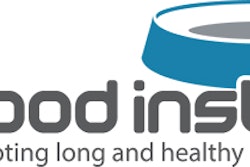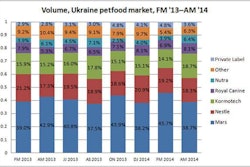During the 2014 Feed and Pet Food Joint Conference, October 7-9 in Omaha, Nebraska, USA, Daniel McChesney, PhD, director of the office of surveillance and compliance for the US Food and Drug Administration’s (FDA) Center for Veterinary Medicine, highlighted key revisions to the preventive control rule for petfood and feed under the Food Safety Modernization Act (FSMA).
McChesney said FDA received more than 2,100 comments to the original proposed animal feed preventive control rule released in October 2013, including many from consumers. Industry organizations, such as the Pet Food Institute and National Grain and Feed Association (co-organizers of the Feed and Pet Food Joint Conference), along with the American Feed Industry Association, also offered in-depth feedback on the original rule.
With the re-proposed rule, which FDA released September 29, 2014, and McChesney referred to as the supplemental proposed rule, the agency is only asking for comments on new or revised areas, though it will accept comments on other areas. FDA is accepting comments for 75 days from the release date.
The major revisions included in the supplemental rule, McChesney said, include:
- A “very small business,” which would be exempt from complying to some elements of the rule, is now defined as having less than US$2.5 million in total annual sales of animal food, adjusted for inflation. McChesney commented that 98% of the animal food (including petfood) industry in the US would be covered outside this exclusion. However, he also said FDA is seeking comments on whether dollar sales are the best measure for feed and petfood. Would units of sale, for example, be better?
- Current good manufacturing practices (CGMPs), which were a big area and focus of comments received, McChesney said; feedback to the original proposed rule said it made CGMPs too prescriptive, too similar to ones for human food and too stringent to be prerequisites because of the diversity of animal food facilities. In response, FDA modified that section of the rule, keeping the structure of human food CGMPs but rewriting the ones for animal food to be less prescriptive. McChesney said he thinks they're much closer to being appropriate for animal food but FDA is still looking for comments.
- Under hazard analysis and critical control points (HACCP) plans, comments to the original proposed rule expressed concern with use of the word “known” in terms of identifying hazards, because that might have led to food facilities needing to control every single conceivable hazard out there. While McChesney said that was never FDA’s intent, the agency did change the wording in the supplemental proposed rule to “significant hazards,” also replacing the wording “reasonably likely to occur.”
McChesney commented that in written food safety plans, which FSMA will require of every facility but very small businesses, manufacturers will need to define hazards they are controlling—and how—outside of CGMPs. So, if a facility has comprehensive CGMPs, it might have a very narrowly focused, short safety plan.
With supplier verification, comments to the original proposed rule agreed it's a good idea but didn't like how FDA proposed doing it. So, McChesney said, FDA looked at the foreign supplier verification rule under FSMA and how that might apply to domestic suppliers. In the supplemental proposed rule, FDA is providing flexibility for each facility to determine appropriate verification activities of its suppliers. However, it will likely require an annual audit of significant hazards; unless you're controlling that hazard at your facility, you should verify your supplier is controlling it.
Finally, in response to a question about how FDA inspectors will be trained to enforce FSMA rules, McChesney said that at least initially, inspectors will be looking mainly to see that facilities and their personnel understand the rules and how their company is following them; they would not be looking to write tickets for noncompliance. In other words, initial visits will be focused on education, not compliance.













